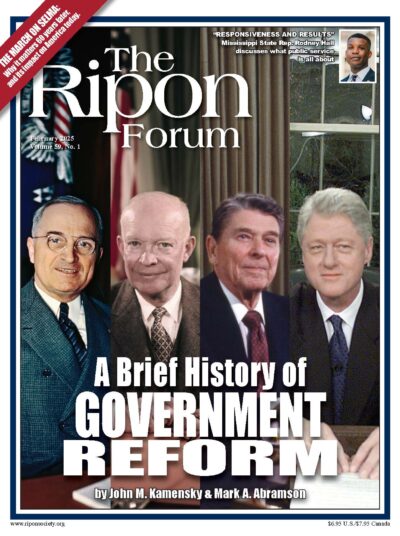
After decades of deindustrialization, stagnating wages, and the hollowing out of communities across the country, it is clear that the international trading system has failed America. No one has highlighted the damage that “free trade” policies have caused more than President Donald Trump. As former U.S. Trade Representative Robert Lightizer correctly wrote, these failures are not “because free trade doesn’t work” but “because free trade doesn’t exist.”
By imposing tariffs on China — and threatening to impose them on Mexico and Canada —Trump is addressing an urgent national security issue — the fentanyl crisis, which is killing thousands of our citizens every month. But using tariffs as leverage on critical national security matters should not be confused with the fundamental fact that the global trading system has failed our country, leading to a record $39 billion agricultural trade deficit in 2024 and a weakened manufacturing base.
Trump’s bold trade and tariff agenda is not just a negotiating tool — it’s a long-overdue strategy to rebuild America’s industrial base, strengthen national security, and generate significant revenue to fund domestic priorities. His proposal to implement universal tariffs represents a necessary course correction after decades of failed free trade policies that have gutted American manufacturing and left U.S. workers competing against subsidized foreign labor.
Trump’s bold trade and tariff agenda is not just a negotiating tool — it’s a long-overdue strategy to rebuild America’s industrial base, strengthen national security, and generate significant revenue to fund domestic priorities.
For decades, Washington’s so-called economic “experts” insisted that free trade would benefit the U.S. and that tariffs would hurt the economy, raise consumer prices, and spark global retaliation.
But real-world data proves them wrong.
The first round of Trump tariffs in 2018 did not raise consumer prices. In fact, the International Monetary Fund (IMF) found no evidence of this, and former Treasury Secretary Janet Yellen said tariffs will not result in any meaningful price increases.
Opposition to tariffs isn’t about sound economics — it’s a coordinated effort by multinational corporations to keep America dependent on foreign supply chains. These are the same economists who predicted NAFTA would create nearly 200,000 American jobs — it wiped out one million. They claimed Permanent Normal Trade Relations (PNTR) with China would be a win for U.S. manufacturing — their estimates were directionally wrong by a factor of seven, and America suffered the biggest industrial collapse in modern history.
One of the most overlooked benefits of tariffs is their potential as a revenue source to fund critical domestic initiatives. A universal tariff could generate billions — or even trillions — of dollars in revenue that could be used to offset other taxes on working-class Americans, fund infrastructure projects, and invest in industries that are critical to economic and national security.

One of the most overlooked benefits of tariffs is their potential as a revenue source to fund critical domestic initiatives.
Trump has already pledged no taxes on tips, and he wants to make major investments in American infrastructure and domestic production. Tariffs provide a practical way to pay for these initiatives without raising income taxes on hardworking Americans.
The anti-tariff Tax Foundation claims Trump’s universal tariffs on Mexico and Canada would cost American households an additional $830 annually. They insist that 100 percent of the tariffs are passed on to consumers, which has never been the case in economic history. But even if their numbers were correct, that’s $16 per week — in exchange for a stronger economy, increased wages, and a more resilient supply chain. That’s a tradeoff most Americans would take in a heartbeat.
America’s middle class has seen stagnating wages for decades. Since the 1970s, the cost of living has risen dramatically, while earnings for working-class Americans have failed to keep up. Tariffs change this equation by reshoring production, increasing demand for skilled labor, and raising wages. The result? Better-paying jobs in industries that actually sustain families — not more low-wage service jobs.
I run a fourth-generation American manufacturing company that buys steel and aluminum, and I’ve seen firsthand what happens when tariffs are used as part of an overall trade and industrial strategy that prioritizes domestic production. During the first Trump administration, we saw initial price spikes in raw materials, but that was largely due to supply chain disruptions from the pandemic. Since then, prices have stabilized, and massive new investments in American production have emerged. This is how tariffs work: they create incentives for domestic production, which leads to more supply and long-term price stability.
Countries like China, Germany, Japan, and South Korea have built their economies around trade surpluses and aggressive industrial policies that distort markets and undermine any notion of a “level playing field.” These nations subsidize their industries, manipulate currencies, and erect non-tariff barriers while benefiting from an outdated system that allows them to flood the U.S. market with underpriced goods.
Mexico and Canada, supposedly America’s closest trade partners, have instead facilitated China’s economic warfare against the U.S. Mexico, in particular, has become a key transshipment hub for Chinese goods, exploiting the 2019 USMCA agreement to evade U.S. trade enforcement. Mexico’s blatant trade violations have also eroded American jobs in steel and aluminum. Steel imports from Mexico have also surged 472 percent beyond agreed-upon levels in 2023, with early 2024 data indicating an even sharper 700 percent increase — devastating American producers and forcing plant closures.
Alarmingly, Mexico has actively courted Chinese investment, advertising itself as a duty-free gateway for China to bypass U.S. tariffs. Chinese factories in Mexico don’t create real production but instead repackage and reroute goods into the U.S. under false labels. China uses the same strategy in Southeast Asia, further undermining U.S. trade laws.
This is why universal tariffs are essential — they eliminate the need for endless legal battles over transshipment and circumvention, and they are the boldest and most effective tool to rebuild industrial production and secure America’s economic future. It’s time to put American workers, industry, and security first. That starts with a pro-American trade and tariff agenda — and Trump is right to take bold action to implement it.
Zach Mottl is the Chairman of the Coalition for a Prosperous America (CPA) and President of Atlas Tool Works.




